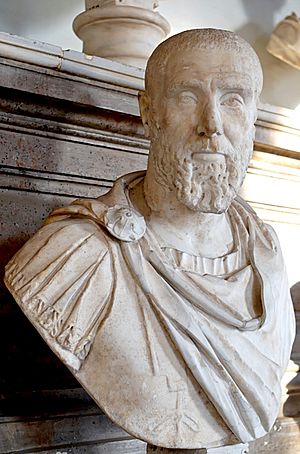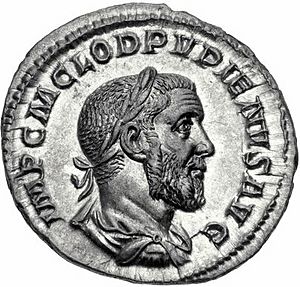Pupienus facts for kids
Quick facts for kids Pupienus |
|||||||||
|---|---|---|---|---|---|---|---|---|---|
 |
|||||||||
| Roman emperor | |||||||||
| Reign | April/May – July/August 238 | ||||||||
| Predecessor | Gordian I and II | ||||||||
| Successor | Gordian III | ||||||||
| Co-emperor | Balbinus | ||||||||
| Born | c. 168 | ||||||||
| Died | 238 (aged approx. 70) Rome, Italy |
||||||||
| Issue Detail |
|
||||||||
|
|||||||||
| Father | ? Marcus Pupienus Maximus | ||||||||
| Mother | ? Clodia Pulchra | ||||||||
Marcus Clodius Pupienus Maximus (born around 168 AD, died 238 AD) was a Roman emperor. He ruled alongside Balbinus for about 99 days in the year 238. This year is known as the Year of the Six Emperors because many different emperors ruled in a short time. We don't have a lot of information about Pupienus from that time. People often called him "Maximus," which was part of his name.
Contents
Pupienus's Early Life and Career
Some old writings, like the Historia Augusta, say that Pupienus started from humble beginnings. They claim he was the son of a blacksmith and worked his way up in the Roman army and government. He supposedly began as a Centurion (a military officer) and then became a tribunus militum (military tribune) and a praetor (a high-ranking official).
These writings also suggest he had an amazing career. He held important jobs during the time of the Severan dynasty (a family of emperors) in the late 100s and early 200s AD. He was said to be a governor in places like Bithynia et Pontus, Achaea, and Gallia Narbonensis.
However, modern historians believe Pupienus actually came from a noble family, even if they weren't super famous. His family might have become important more recently. He was likely from the city of Volterra in Etruria, Italy. It's thought his father was Marcus Pupienus Maximus, a senator who was the first in their family to join the Senate.
Many historians don't fully trust the Historia Augusta. For example, the province of Bithynia et Pontus was ruled by an emperor's representative during Pupienus's time, not a senator. Also, it was very unusual for someone to be governor of three different provinces like that. Historians prefer to check information from the Historia Augusta with other sources.
After he became a consul (a top government official) around 222 AD, we have more reliable information about his career. Pupienus later became a governor in one of the German provinces, probably after his first time as consul around 207 AD. While he was governor there, he won battles against the Sarmatians and other German tribes. After his time in Germania, he was chosen by lot to be the governor of Asia.
In 234 AD, near the end of Severus Alexander's rule, he became consul for a second time. In the same year, he was also made the Urban Prefect of Rome. This job meant he was in charge of the city. He was known for being very strict, which made him unpopular with the people of Rome.
Becoming Emperor
In 238 AD, when Gordian I and his son were declared emperors in Africa, the Roman Senate chose a group of twenty men. Pupienus, who was an older senator, was part of this group. Their job was to organize the fight against Maximinus Thrax, who was the current emperor.
But then, news arrived that the Gordians had been defeated and died. So, the Senate met secretly in the Temple of Jupiter Capitolinus. They voted to make two members of their committee co-emperors: Pupienus and Balbinus. Both emperors were also made pontifices maximi, which meant they were the chief priests of Rome's official religions.

Historians like Edward Gibbon wrote that this was a smart choice. Pupienus was known for his bravery and skills. He had risen through the ranks in the government and army. His victories against tribes, his strict way of life, and his fair justice as city prefect earned him respect. Balbinus, on the other hand, was more liked by the people. Both men had been consuls, and they were both older (one was sixty, the other seventy-four), so they had a lot of experience.
However, some groups in the Senate wanted to benefit from the Gordians being emperors. They influenced the people and the Praetorian Guard (the emperor's bodyguards) to demand that Gordian III be made an emperor too.
Pupienus left Balbinus in charge of Rome's government. Around late April, Pupienus traveled to Ravenna. From there, he led the campaign against Maximinus. He even recruited German soldiers who had served under him before. Maximinus was later killed by his own soldiers near Aquileia. Pupienus then sent Maximinus's soldiers and his own back to their homes, giving them a lot of money. He returned to Rome with his new German bodyguards.
The End of Their Reign
While Pupienus was away, Balbinus struggled to keep order in Rome. The old writings suggest that Balbinus worried Pupienus might use his German bodyguards to take over completely. Because of this, the two emperors started living in different parts of the Imperial palace.
This made them vulnerable to the Praetorian Guard. The Praetorians didn't like serving emperors chosen by the Senate, and they planned to kill Pupienus and Balbinus. Pupienus realized the danger and asked Balbinus to call for the German bodyguards. But Balbinus thought Pupienus was trying to trick him and refused.
As they argued, the Praetorians burst into the room. They grabbed both emperors and dragged them to their barracks. There, they tortured and killed them in the bath house. Pupienus and Balbinus had ruled for only 99 days.
Pupienus's Family
We know of three people who were likely Pupienus's children.
- Titus Clodius Pupienus Pulcher Maximus was a consul around 235 AD. He was also a supporter of the town of Tibur near Rome. He is thought to be Pupienus's oldest son.
- Marcus Pupienus Africanus Maximus was a consul in 236 AD, serving with Emperor Maximinus Thrax. He is believed to be Pupienus's youngest son.
- Pupienus also had a daughter named Pupiena Sextia Paulina Cethegilla. She was married to Marcus Ulpius Eubiotus Leurus.
The fact that his sons became consuls during the reigns of Severus Alexander and Maximinus Thrax shows that Pupienus's family was important and well-regarded.
| Quintus Tineius Sacerdos Clemens consul ordinarius |
Marcus Pupienus Maximus | ||||||||||||||||||||||||||||||||||||||||||||||||||||
| Quintus Tineius Clemens consul ordinarius |
Quintius Tineius Rufus consul 182 |
Quintus Tineius Sacerdos consul suffectus ∞ Volusia Laodice |
Pupienus Roman Emperor (238) ∞ Sextia Cethegilla |
Marcus Ulpius Leurus senator |
|||||||||||||||||||||||||||||||||||||||||||||||||
Maximinus Thrax Roman Emperor 235-238 ∞ Caecilia Paulina |
Gordian I Roman Emperor 238 |
Tineia | Titus Clodius Pupienus Pulcher Maximus consul suffectus |
Marcus Pupienus Africanus Maximus consul ordinarius ∞ Cornelia Marullina |
Pupiena Sextia Paulina Cethegilla | Marcus Ulpius Eubiotus Leurus suffect consul |
|||||||||||||||||||||||||||||||||||||||||||||||
| Gaius Julius Verus Maximus caesar |
Gordian II Roman emperor 238 |
Antonia Gordiana | Lucius Clodius Tineius Pupienus Bassus proconsul ∞ Ovinia Paterna |
Balbinus Roman emperor 238 |
|||||||||||||||||||||||||||||||||||||||||||||||||
Gordian III Roman Emperor 238-244 |
|||||||||||||||||||||||||||||||||||||||||||||||||||||
See also
 In Spanish: Pupieno para niños
In Spanish: Pupieno para niños
 | Sharif Bey |
 | Hale Woodruff |
 | Richmond Barthé |
 | Purvis Young |

